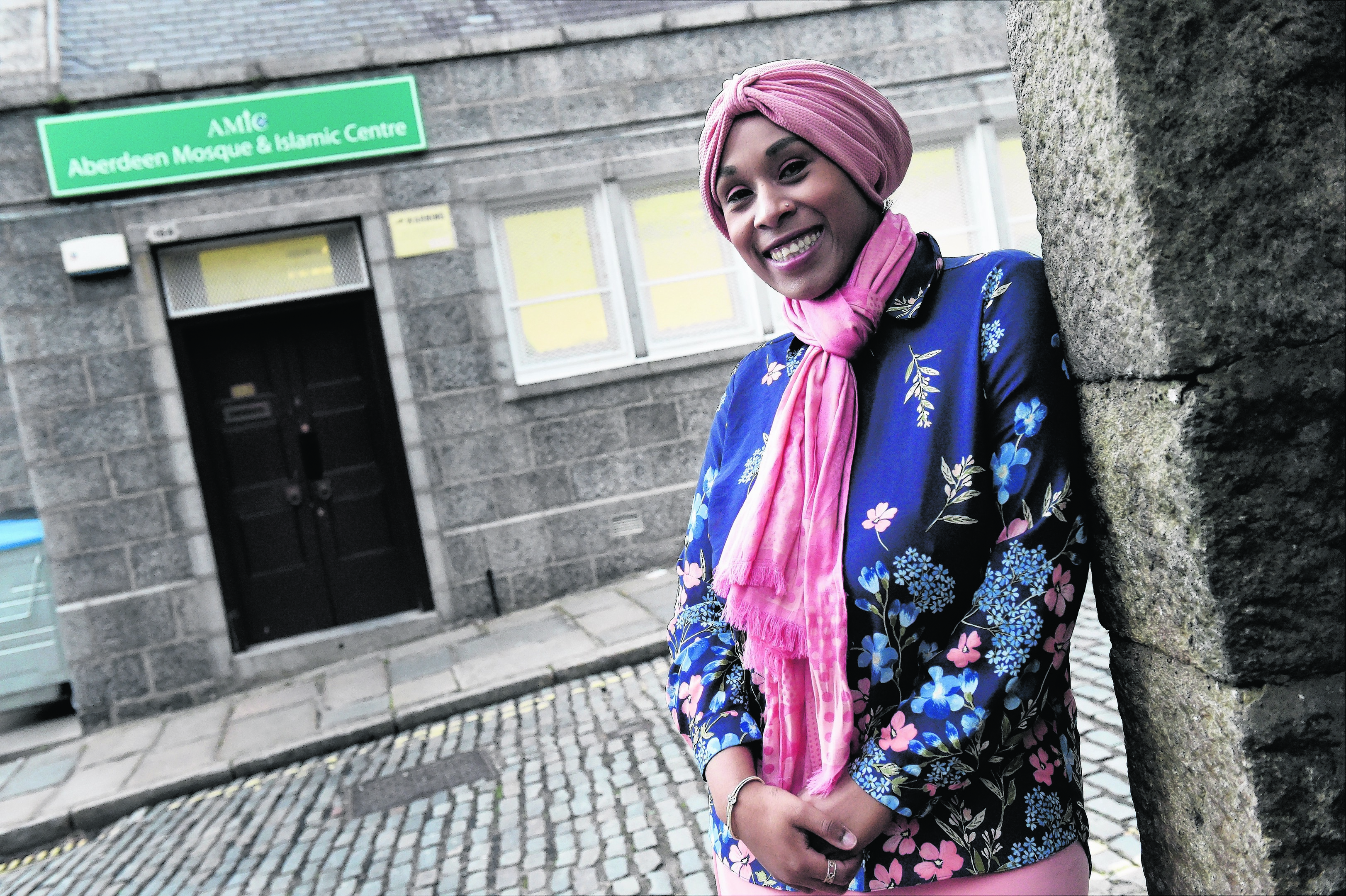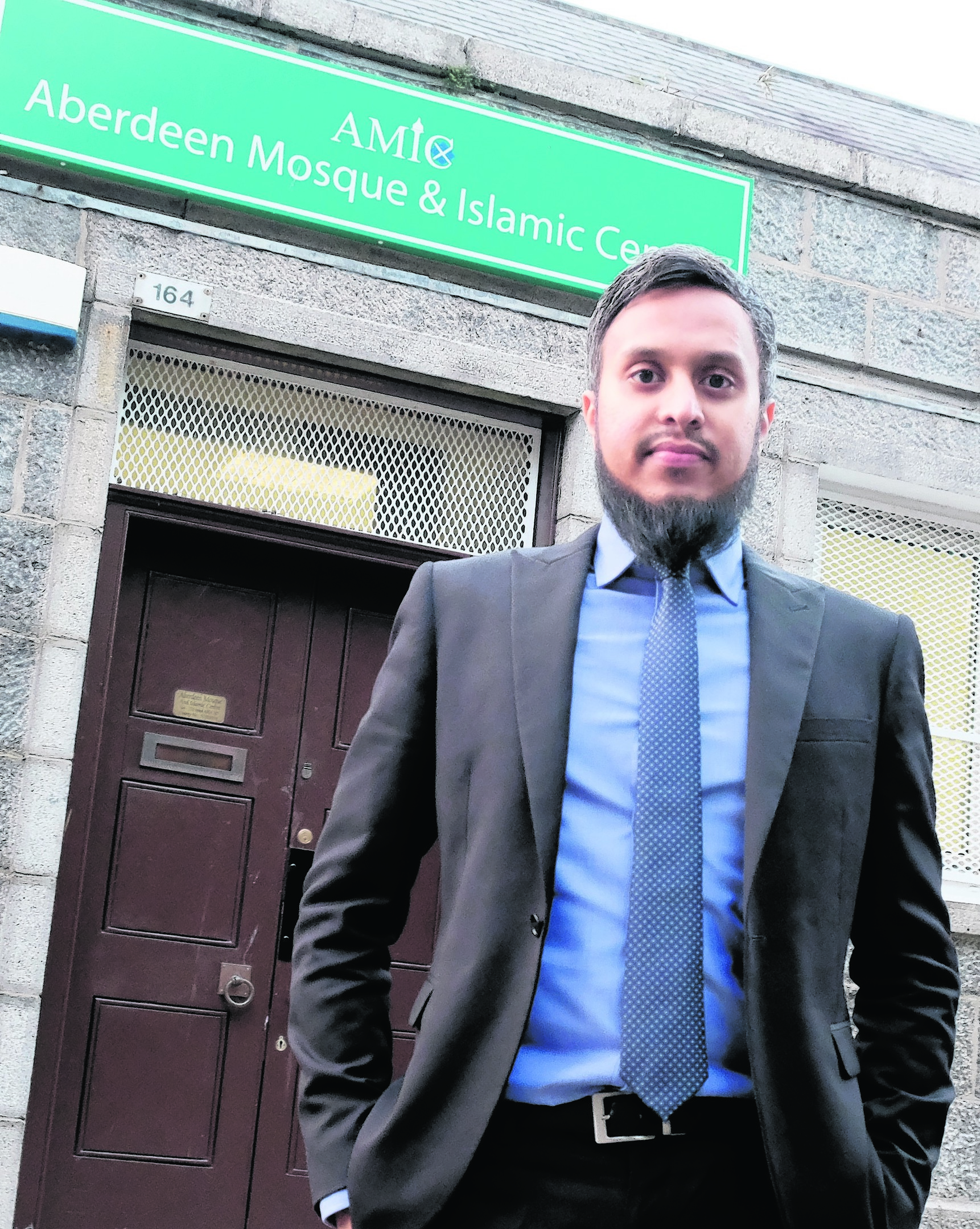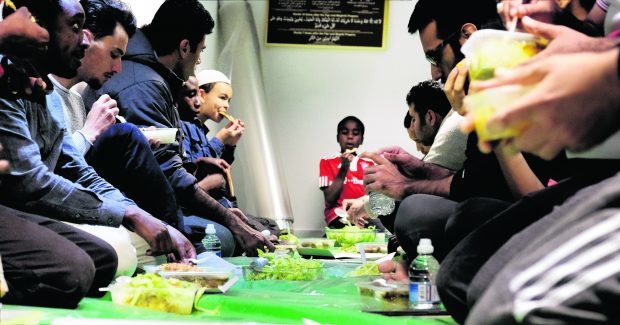Dusk is slowly creeping in and the night air feels fresh and sharp, whilst pools of light from the street lamps spill onto the cobbles.
As the city goes to sleep there are hushed greetings, and dozens of men and women troop in through separate entrances into a building in Old Aberdeen.
Rows of shoes are arranged neatly at the door, from simple black pumps to bright trainers, and a pair of Crocs which have just been pounding hospital corridors.
The smell of sliced orange combines with the sugary tang of dates, and trays of fresh fruit are placed in the middle of the floor.
The call to prayer crackles over the speakers before everyone glances around and smiles knowingly – the muezzin admits he’s two minutes early in his announcement.
The women laugh as they scroll on their phones, before falling silent and forming a line for worship.
I understand not one word of Arabic yet it is strangely beautiful to watch.
There are women of all ages, and a little girl flashes me a smile wearing a Peppa Pig T-shirt and the Hijab.
I’ve been invited to join the Muslim community as they celebrate Ramadan, which sees people fast from dawn until dusk in a bid to achieve a higher level of spirituality.
Ramadan is dictated by the Lunar calendar meaning Muslims must not consume food or water from roughly 2.30am when the sun rises, right through to sunset just after 10pm.
They then break their fast and come together to pray, and Ramadan comes to a close today following 30 days of fasting.
I am the only person in the room not covering my head, but as I sit cross legged on the floor, I am greeted like an old friend.
Affectionate kisses are planted on my cheek and my shoulders are warmly grasped, before a date is pressed into my hand.
The sense of togetherness is incredibly moving, but the strength many Muslims clearly find in their faith is mingled with uncertainty.It is less than a week since one person died and 11 people were injured after a van was driven into a crowd of Muslim worshippers in Finsbury Park, North London.
Witnesses said the driver shouted “I want to kill all Muslims” and the incident has been declared a terror attack on the Muslim population. No-one loiters on the pavement outside the mosque in Aberdeen and Police Scotland has been in touch with a warning to be vigilant.
Prime Minister Theresa May has said security at mosques will be reviewed whilst Muslim leaders across the country have called for security to be stepped up in the final week of Ramadan.
There has been a steep rise in the number of Islamophobic offences recorded by the Metropolitan Police after attacks in Westminster, London Bridge and Manchester.
Mosques across the north-east have also been warned by Police Scotland to be vigilant, with communities urged not to gather outside the mosque in case of attacks.
But what does it feel like to be Muslim in today’s society, and what does the religion truly mean to those who call Scotland home?
ROMISA’S STORY

Romisa Albashir looks around furtively then whispers her age. “Please don’t say how old I am, I’ve got such a complex about it,” she says.
Romisa, who also refers to herself as Ally, because “it’s easier to spell” is not yet 30, but asks me to keep the exact figure a secret.
Her skin is flawless and her expressive brown eyes are carefully lined with black kohl and a dusky pink eye shadow. Wearing a dark blue blouse covered in flowers, Romisa’s pink skirt matches her Hijab which covers her hair.
She easily switches between fluent Arabic and a clear Aberdonian accent – she was born and raised in the Granite City.
She introduces me to her mother who is dressed more conservatively in black, and she kisses my cheek three times in greeting.
Both women are university educated, and Romisa splits her time between the family home in Bridge of Don and teaching in Saudi Arabia. She is currently on holiday and finds Ramadan easier when not working, but her sister is a junior doctor and must juggle Ramadan alongside long hours.
“I am not fasting today anyway but I am lucky in that I’m just relaxing for the next few weeks,” she says.
“I spent quite a lot of the fast in Saudi though and it can be super difficult.”
She asks me about my job, my family, and squeezes my arm playfully when I mention I’m meant to be asking the questions.
“For reals, I’m such a chatterbox and I really need to stop saying for reals,” she says.
“I had this idea of inviting the community round to my house for Ramadan, so people can see what it is all about.
“I know it sounds cheesy but I think it is more important than ever that people come together.
“You don’t have to be Muslim to come to the mosque, this right now is what Islam is all about.
“We’re a sisterhood and everyone is welcome. You don’t need to cover your head if you don’t want to.
“I find it very frustrating that people can associate Islam with the narrative of down-trodden women.
“I come from a family of educated women, I’ve travelled widely and I currently live abroad on my own.
“I see myself as an independent woman. Saudi is not representative of our entire religion, people often comment on how women aren’t allowed to drive in Saudi but that is just one country.
“I feel like I’ve spent my entire life defending who I am.
“After the Manchester attack I had a light bulb moment. I don’t listen to Ariana’s Grande’s music, I wasn’t at the concert, yet myself and thousands of other Muslims find ourselves apologising for the actions of one nutcase.
“That is the only way to describe him. After the attack I logged on to social media and I saw so many of my Muslim friends apologising.
“It is absurd and I don’t want to say sorry any longer.
“I see myself as British, this is my home turf too. After the Finsbury Park attack, I didn’t see my non-Muslim friends coming forward to say sorry on behalf of the attacker and why should they?
“In that same token, I am not going to keep apologising.
“After Finsbury happened, I rang my family who live in London to make sure they were safe. I’m fearful and I told all the female members to stay in groups.
“As a woman wearing the Hijab, you’re a target. I am also hopeful though. I am hopeful that people will come to the mosque, they will come to Eid which is like our version of Christmas.
“To me, education is key and if we keep talking, maybe we’ll realise that we are all human.”
MA’ARUF’S STORY
It’s been a long day for Ma’aruf Razzak but come 10pm, he still looks immaculate in a tailored suit.
He has left his two children, two-year-old Adam and Anaya, five months, at home, along with his wife, Rucksana.
I first meet him at the impressive offices of Shepherd+Wedderburn, where 32-year-old Ma’aruf is legal director, alongside his role as vice president of Aberdeen Mosque and Islamic Centre, the first established mosque in Aberdeen, based on the Spital.
He’s also the Chairman of Aberdeen Muslims which is a not for profit organisation. Its membership is made up of people of all faiths and backgrounds and the group has a strong focus on helping the local community and the disadvantaged.
They run a monthly initiative called Foodbox where service users are provided with a free hot meal cooked freshly from a local restaurant.
For Ma’aruf, Aberdeen Muslims and Foodbox is proof that co-operation and collaboration is a means of fighting Islamophobia and dispelling fear of the unknown.
“There are roughly three and a half thousand Muslims across Aberdeen and the Shire and it is a very diverse mix of people,” he says.
“Asians, Arabs, Africans and even some locals who have also embraced Islam – there’s this narrative in the media that Muslims don’t integrate into society and it simply isn’t the case.
“There are a lot of misconceptions about Muslims and Islam and naturally people can be apprehensive.
“If people simply asked questions and sat down for a cup of tea to have a chat, they can build many bridges and strong bonds.
“The local mosque holds open days throughout the year where everybody is welcome to visit and learn about Muslims and the religion.
“A lot of people are surprised that my son is called Adam, but Adam is actually an Islamic name.
“We believe that Jesus, just like Adam and Muhammad (peace be upon them), is one of the prophets of Islam, the only difference is that we don’t believe he is the son of God.
“In Islam our belief is that God is one and has no partners or associates.
“People who have negative views on Muslims often don’t really know Muslims, whereas those who work with or live next door to Muslims can see that we are all humans and living life with the same joys and sorrows.
“When it comes to the month of Ramadan, fasting starts just before sunrise which is about 2.10am in Aberdeen at this time of year.
“We pray five times a day and some prayers fall within the working day. Many work places will set aside a room or space for you to pray.
“At Shepherd+Wedderburn, everybody is always accommodating throughout the different offices we have and if colleagues walk into my room whilst I am praying they simply return a little later.
“I personally do not find fasting in Ramadan difficult but as with everything in life, it’s how you approach it. If you are positive then you will have a productive and rewarding month.
“A common misconception is that everybody must fast no matter the circumstances. There are however exceptions to those who have to fast in Ramadan, with exemptions ranging from if you are ill, elderly, pregnant and especially if you are prepubescent.
“When the sun sets the fast is over, it’s not a case of over indulging and eating anything you can get your hands on because that would be a little pointless.
“We traditionally break the fast by eating dates, which are a prophetic fruit, and drinking water.
“Of course there is a worry within the community at the moment following the recent attacks in London – however, we ask everybody in the community to remain vigilant and proceed as normal in their day to day activities with the hope that things will return to normal.

“When a hate attack happens, you think it could have potentially been my family affected. This is regardless of where it occurs or who carries it out.
“It’s also worth remembering that it is the minority of people who carry out such attacks whether it be carried out by a Muslim or a Christian or a non-religious person. What is important is that we cannot tar everyone with the same brush.
“We need to be there for each other in the community. If I saw someone fall down in the street, whether they’re black or white, Muslim or Christian, I would help them without thinking twice about it. We can’t let hate overtake humanity and kindness.”
DR WAHEED’S STORY
As Doctor Waheed’s forehead touches the floor in prayer, he is joined by two priests from Inverness Cathedral.
The trio make for an unusual sight although their religious dress is not dissimilar.
They may be of different faiths but they are united by a belief that hatred cannot be allowed to win.
Doctor Waheed is one of six trustees at Inverness Masjid & The Highlands Islamic Education and Community Centre.
Muslims make up just 1% of the population in Inverness, but the small community is incredibly active.
Doctor Waheed splits his time between Raigmore Hospital and London, but wants the mosque in Inverness to hold more open days.
“Muslims are the real victims from people who claim to be Muslims, such as Isis,” he says.
“I think that’s partly why every time there is a terrorist attack, we feel the need to put out statements disassociating ourselves from what has happened and condemning the attacker.
“It goes without saying that people who claim to be killing in the name of Allah clearly have some sort of mental health problem, but still we apologise.
“We have been trying to move forward and find a solution for years, and in my mind I always return to the idea of interfaith.
“We pray for everybody regardless of their religion or what they may have done in their life. We attend prayer at Inverness Cathedral and vice versa – this concept of interfaith unites us.
“We need to educate people of all religions against extremism, and we need to unite regardless of skin colour, background, and religion.”
